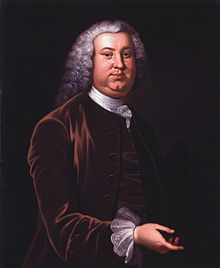Peyton Randolph
| Peyton Randolph | |
|---|---|
 |
|
| 1st and 3rd President of the Continental Congress | |
|
In office September 5, 1774 – October 22, 1774 |
|
| Preceded by | New creation |
| Succeeded by | Henry Middleton |
|
In office May 10, 1775 – May 24, 1775 |
|
| Preceded by | Henry Middleton |
| Succeeded by | John Hancock |
| Speaker of the Virginia House of Burgesses | |
|
In office 1766–1775 |
|
| Preceded by | John Robinson |
| Succeeded by | Office abolished |
| Personal details | |
| Born |
September 10, 1721 Williamsburg Colony of Virginia |
| Died | October 22, 1775 (aged 54) Philadelphia Province of Pennsylvania |
| Resting place | Chapel of the College of William and Mary |
| Spouse(s) | Elizabeth Harrison |
| Alma mater | College of William and Mary |
| Signature | |
Peyton Randolph (September 10, 1721 – October 22, 1775) was a planter and public official from the Colony of Virginia. He served as Speaker of the Virginia House of Burgesses, president of Virginia Conventions, and the first President of the Continental Congress.
Randolph was born in Tazewell HallWilliamsburg, Virginia to a prominent family. His parents were Sir John Randolph, the son of William Randolph, and Susanna Beverley, the daughter of Peter Beverley; his brother was John Randolph. His father died when he was 16.
Randolph attended the College of William & Mary, and later studied law at Middle Temple at the Inns of Court in London, becoming a member of the bar in 1743. He lived his adulthood in Williamsburg, Va.
Randolph returned to Williamsburg and was appointed Attorney General of the Colony of Virginia the next year.
He served several terms in the Virginia House of Burgesses, beginning in 1748. It was Randolph's dual roles as attorney general and as burgess that would lead to an extraordinary conflict of interest in 1751.
The new governor, Robert Dinwiddie, had imposed a fee for the certification of land patents, which the House of Burgesses strongly objected to. The House selected Peyton Randolph to represent their cause to Crown authorities in London. In his role as attorney general, though, he was responsible for defending actions taken by the governor. Randolph left for London, over the objections of Governor Dinwiddie, and was replaced for a short time as attorney general by George Wythe. Randolph resumed his post on his return at the behest of Wythe as well as officials in London, who also recommended the Governor drop the new fee.
...
Wikipedia
